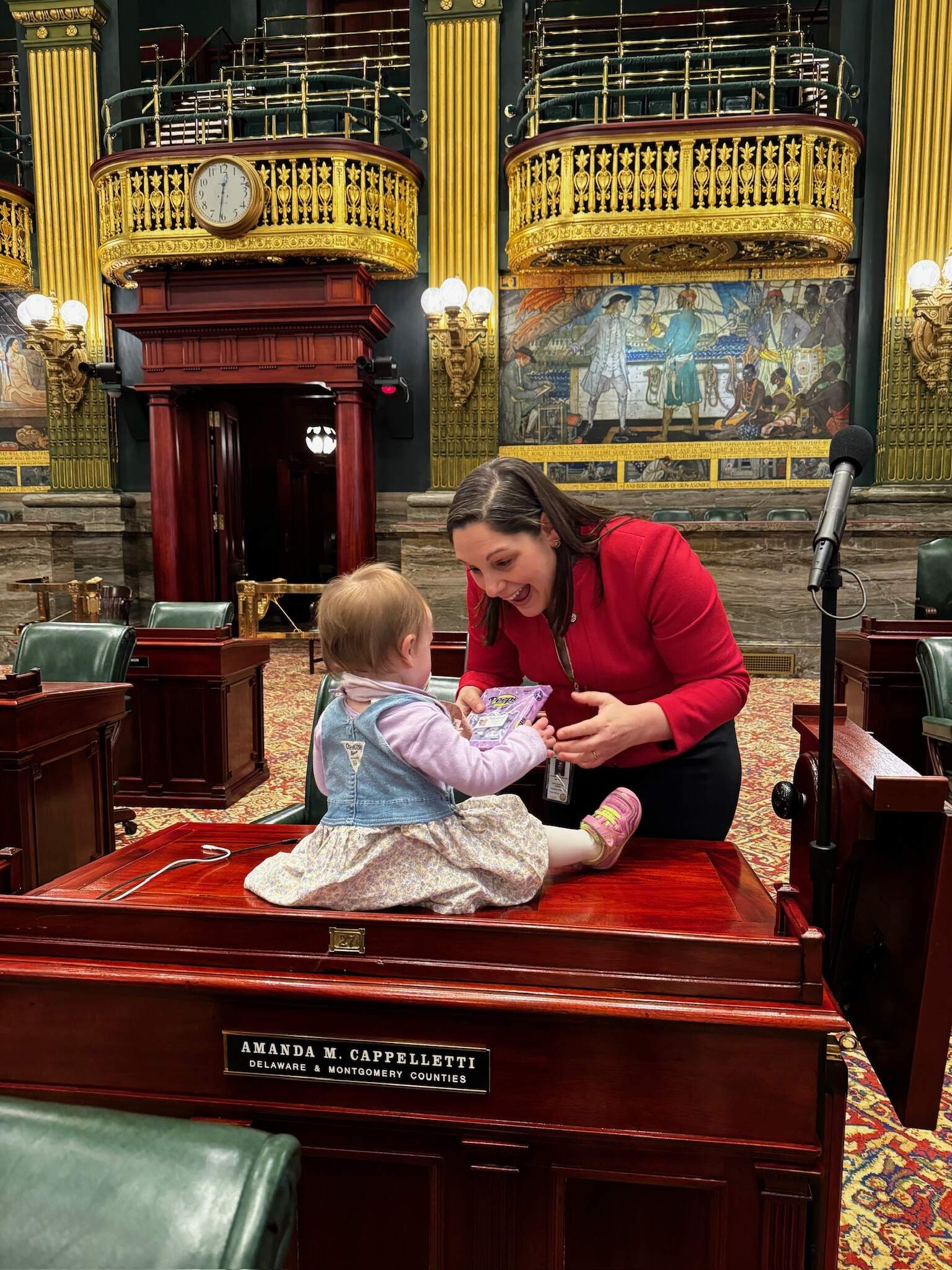Advertisement
How child care access changes who runs for office
Resume
Like many working parents, Hawaii Democratic State House Rep. Jeanné Kapela is struggling to afford child care as a new mom to a baby girl.
“If I was to put her in infant care, it would cost me $3,000 a month. That’s more than my paycheck,” Kapela says. “So it's really just not possible. And my only option is just to bring her to my committee meetings, to my committee hearings.”

Pennsylvania Democratic State Sen. Amanda Cappelletti can relate.
She’s juggling the demands of a re-election campaign with caring for her toddler.
“Running for office while having a little one has been a really challenging experience, especially because my husband and I made the decision very early on [that] we didn't want to post our daughter's face on social media,” Cappelletti says. “So that really limits what we can take her to when there are events. And that takes a toll on you because you feel really guilty as a partner, being in a partnership, not necessarily feeling like you're pulling your weight at home.”
Cappelletti was the first person to give birth while serving in the Pennsylvania state senate.
And soon, Georgia Democratic State Sen. Nabilah Islam Parkes is expected to make history in her own state as the first person to give birth while serving in the state senate there.
She’s running for re-election in November and is pregnant with her first child – a boy, due in August.
“Everyone is excited about the fact that the senator is pregnant … but no one is wondering what it's going to be like when I actually give birth,” Islam Parkes says. “And then I have a newborn that I need to take care of three months before Nov. 5. And that is something I'm asking myself every day, like, how am I going to do this? And I'm worried about being able to campaign and also take care of my new baby.”

Islam Parkes will have at least one tool that could help that hasn’t always been available to other candidates.
Georgia is one of 31 states to allow the use of campaign funds for child care.
Liuba Grechen Shirley, founder of the Vote Mama Foundation, a group that advocates for moms running for office, hopes the move will help more working class people run for office as currently, less than 7% of members in Congress are moms of children under 18.
Grechen Shirley first championed this change at the federal level in 2018 when she ran for Congress in New York.
So far, she says federal and state candidates have used $1 million to pay for child care.
5 questions with Liuba Grechen Shirley
Why does it matter that this subsection of women hold office and be accommodated when they actually do it?
“It matters because lived experience matters. Legislators legislate based on their lived experience. One of our candidates was actually speaking to her representative and was explaining her experience with medically necessary abortion, and he was shocked to hear that you could have a miscarriage in your second pregnancy. He said, ‘I thought you could only have a miscarriage in your first pregnancy.’ So when you have this lack of lived experience in these positions of power, in these decision making positions, you're missing out on really critical conversations and you're not having the policies that actually will help people in this country.”
What are the challenges that new moms and moms of young children face when they are running for office?
“You're expected to work 18 hours a day when you run for office. If you're running for Congress, it can be up to two years without a salary. That right there is the first problem. And that doesn't just affect moms. It affects anybody who is not independently wealthy. We have more millionaires in Congress than we do moms of minor children. And when you're in office, you're expected to be at every single pancake breakfast, every single constituent meeting. You're supposed to be fundraising constantly. You're working around the clock. And there is very little time for family life. There are unpredictable voting schedules. Sometimes you get called for a vote at two in the morning.”
What are the Federal Election Commision rules for using campaign funds for child care?
“These are private dollars that you're raising for your campaign for child care. So when you're making the decision, you can either purchase more lawn signs or more campaign literature, or you can hire a babysitter so you can go out and knock on doors and talk to voters. It makes a huge difference for federal candidates. Vote Mama Foundation has now been working to get this approved for state and local candidates. We actually have to go state by state to get this approved. We're at 31 states now, plus D.C. Nine of those states have also allowed the use of campaign funds for dependent care because there are so many people who are in the sandwich generation caring for both their elderly parents and their children. And the gold standard that we're trying to get passed across the country is that you can also use it not just for when you're campaigning, but for your official legislative duties as well.”
Who would be against this?
“It's an interesting question. We've had so many candidates who even if they're in a state where this is allowed, their staff didn't want them to do it because they thought that they would be politically attacked. It can be looked at as something that people will use against you. But the reality is it changes who gets to run. We've been actually tracking the usage of campaign funds for child care at the federal level. There's been a 662% increase in usage since 2018. And at the state level, a 2,156% increase in usage.”
What do you want people to think about as they decide who they will vote for going forward?
“By the time American women are 45 years old, 85% of us are moms. And yet it's just 6.8% of our congress members who are moms of minor children. And at the state level, it's only 5.3% of our state legislators who are moms of minor children. We want people in office who look like the rest of the population. And so. We are trying to break down these barriers and then working to support these moms once they step up to run and then once they get into office.”
Ashley Locke produced and edited this interview for broadcast with Michael Scotto. Locke also adapted it for the web.
This segment aired on May 14, 2024.

